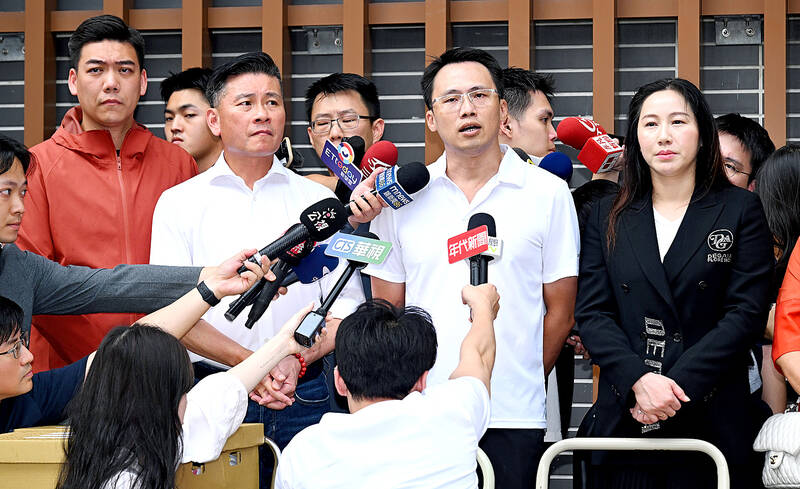Recall petitions targeting Democratic Progressive Party (DPP) legislators Rosalia Wu (吳思瑤) and Wu Pei-yi (吳沛憶) were rejected yesterday, lifting the number of failed attempts in a mass recall by the Chinese Nationalist Party (KMT) to eight.
The campaign against Rosalia Wu collected 27,290 signatures and delivered them to the Central Election Commission’s (CEC) Taipei office at about 1pm, stand-in campaign organizer Chan Chia-wen (詹嘉文) said.
While the signature count exceeded the requirement, the bid was ultimately rejected by the CEC, as the initiator of the campaign was not present to tender the signatures, Chan said.

Photo: Liao Chen-huei, Taipei Times
Chang Ke-chin (張克晉), who initiated the recall bid, on April 30 announced that he was backing out of the campaign. Chan waited outside the CEC office until 5:30pm, hoping that Chang would change his mind, but to no avail.
The campaign would explore and exhaust all alternatives, including petitions or launching an administrative lawsuit, to deliver the motion, Chan said.
Meanwhile, the petition against Wu Pei-yi was delivered to the Taipei office in the afternoon, but was about 3,000 signatures short of the required number, campaign organizer Lee Hsiao-liang (李孝亮) said.
While it fell short, the campaign demonstrated the anger among residents of Wu Pei-yi’s constituency, which covers Taipei’s Zhongzheng (中正) and Wanhua (萬華) districts, Lee added.
Investigations had affected the campaign’s efforts to collect signatures, he said.
Supporters told him that they would vote in a recall election, but would not sign a petition, Lee said.
Prosecutors nationwide over the past weeks have been investigating alleged signature fraud in recall campaigns, resulting in the detention of several KMT officials.
Taipei City Council Speaker Tai Hsi-chin (戴錫欽) of the KMT thanked volunteers who stuck with the recall campaigns against DPP lawmakers until the end.
It was an arduous journey to reach the second phase of the recall campaigns, especially with the investigations, Tai said.
In addition to the two Wu bids, recall petitions against DPP legislators Asenay Daliyalrep, Saidhai Tahovecahe, Tsai Chi-chang (蔡其昌), Ho Hsin-chun (何欣純), Su Chiao-hui (蘇巧慧) and Wu Chi-ming (吳琪銘) have failed.
Petitions targeting Chang Hung-lu (張宏陸), Lee Kuen-cheng (李坤城), Chen Chun-yu (陳俊宇), Lee Chun-hsien (李俊憲), Wang Ting-yu (王定宇), Hsu Chih-chieh (許智傑) and Huang Jie (黃捷) have deadlines this month.
Meanwhile, the CEC said it would announce on June 20 the results of reviews of 31 recall petitions against KMT lawmakers to say whether they have met the second-stage signature threshold.
The Public Officials Election and Recall Act (公職人員選舉罷免法) stipulates that recall campaigns that pass the second stage must be put to a vote 20 to 60 days after substantiation.

Taiwan has received more than US$70 million in royalties as of the end of last year from developing the F-16V jet as countries worldwide purchase or upgrade to this popular model, government and military officials said on Saturday. Taiwan funded the development of the F-16V jet and ended up the sole investor as other countries withdrew from the program. Now the F-16V is increasingly popular and countries must pay Taiwan a percentage in royalties when they purchase new F-16V aircraft or upgrade older F-16 models. The next five years are expected to be the peak for these royalties, with Taiwan potentially earning

STAY IN YOUR LANE: As the US and Israel attack Iran, the ministry has warned China not to overstep by including Taiwanese citizens in its evacuation orders The Ministry of Foreign Affairs (MOFA) yesterday rebuked a statement by China’s embassy in Israel that it would evacuate Taiwanese holders of Chinese travel documents from Israel amid the latter’s escalating conflict with Iran. Tensions have risen across the Middle East in the wake of US and Israeli airstrikes on Iran beginning Saturday. China subsequently issued an evacuation notice for its citizens. In a news release, the Chinese embassy in Israel said holders of “Taiwan compatriot permits (台胞證)” issued to Taiwanese nationals by Chinese authorities for travel to China — could register for evacuation to Egypt. In Taipei, the ministry yesterday said Taiwan

Taiwan is awaiting official notification from the US regarding the status of the Agreement on Reciprocal Trade (ART) after the US Supreme Court ruled US President Donald Trump's global tariffs unconstitutional. Speaking to reporters before a legislative hearing today, Premier Cho Jung-tai (卓榮泰) said that Taiwan's negotiation team remains focused on ensuring that the bilateral trade deal remains intact despite the legal challenge to Trump's tariff policy. "The US has pledged to notify its trade partners once the subsequent administrative and legal processes are finalized, and that certainly includes Taiwan," Cho said when asked about opposition parties’ doubts that the ART was

If China chose to invade Taiwan tomorrow, it would only have to sever three undersea fiber-optic cable clusters to cause a data blackout, Jason Hsu (許毓仁), a senior fellow at the Hudson Institute and former Chinese Nationalist Party (KMT) legislator, told a US security panel yesterday. In a Taiwan contingency, cable disruption would be one of the earliest preinvasion actions and the signal that escalation had begun, he said, adding that Taiwan’s current cable repair capabilities are insufficient. The US-China Economic and Security Review Commission (USCC) yesterday held a hearing on US-China Competition Under the Sea, with Hsu speaking on